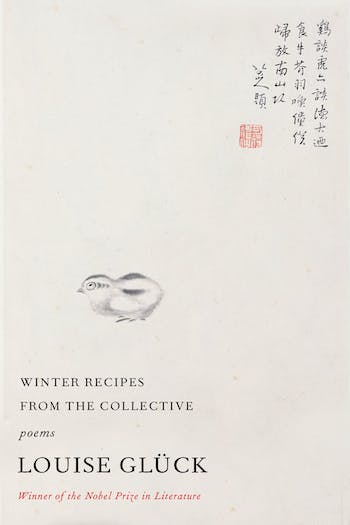Poetry Review: “Winter Recipes From the Collective” — Louise Glück’s Cold Comfort
By Robert Israel
The poems in Winter Recipes From the Collective are about bearing with life in a barren place; they do the kind of singing Bertolt Brecht said was necessary when dealing with “the dark times.”
Winter Recipes From the Collective by Louise Glück, Farrar, Straus and Giroux, 64 pages, $25.

Louise Glück’s 13th volume of poetry, Winter Recipes From the Collective, demands to be read in a quiet room. So seek out a sedate nook, if you can in these tumultuous times. Then settle in. Remove distractions from your mind and read her poems aloud. You may immediately note, as one critic puts it, that her voice proffers an “icy precision.” I don’t totally disagree with this assessment. But to label her work that way is to sell her short. She’s a masterful writer who delights in weaving surprises into her poetry. She does not serve up easy interpretations or convenient summaries. And, for a poet who is accused of being too cool for her own good, Glück frequently dabbles in warmth and humor, both qualities amply displayed in this volume.
When you read her poems aloud, you may notice that she pares her words back, stripping them of embellishment. She achieves what Robert Frost called “sentence sounds,” the kind that originate in the “brute tones of our human throat.” Glück employs this minimalist literary device throughout this slim volume, her first since being awarded the Nobel Prize in literature in 2020.
Glück’s depends on a kind of elemental density, often through vivid metaphorical descriptions, in ways that are reminiscent of the haunting prose of Danish author Isak Dinesen, whose ornate pictorials come with heavy wafts of atmosphere:
Each year when winter came the old men entered
the woods to gather the moss that grew
on the north side of certain junipers.
It was slow work, taking many days, though these
were short days because the light was waning,
and when their packs were full, painfully
they made their way home, moss being heavy to carry.
— the opening lines from “Winter Recipes from the Collective”
Where, later in the poem, do “elderly men and women” cure moss “with wild mustards and sturdy herbs packed between the halves of ciabattine”? The sandwich doesn’t sound appetizing. The poet offers no clues about the location of this primal repast, creating a world that is an uneasy mix of the distorted and the familiar.
Because Glück is interested in contorting existence, it makes sense that in this collection she is attracted to the kind of storytelling that we appreciated as kids, though in the Grimm mode. The poems here are fables in which the woods are enchanting and mysterious and paths don’t always lead to grandmother’s house. In “A Children’s Story,” we learn that a “king and queen” “rattling in the back of the car” grow weary of repeating what has become a singsong conjugation. Arriving at a state of ennui, the royal couple resign themselves to endure “a sad day” that “the day has become.” Glück delivers the tale’s disturbing moral: “All hope is lost,/We must return to where it was lost if we want to find it again.” Perhaps the message reflects generational exhaustion: children should be aware of the fatigue of their elders because they are going to inherit a landscape of “cows and pastures [that] are drifting away,” where nothing is certain or guaranteed. The next generation will have to use their energies to back up and pick up the pieces of a broken world.
Perhaps the most accessible selection is a short poem titled “President’s Day,” first published in the New Yorker. The poet does not lead us down serpentine paths filled with menacing threats hiding in the overgrowth. Rather, she reports on a wintry landscape yielding to the first stirrings of the approaching spring season. Warmth is still a long ways away — a leap of faith is required to imagine that it will arrive soon. “I threw some snow over my shoulder,” Glück writes, “since I had no salt.” She is yearning for spring to arrive with “lots of good-natured sunshine everywhere.” She concludes: “How joyful my head was, basking in it, getting to feel it first while my limbs waited.”
The poems in Winter Recipes From the Collective are about bearing with life in a barren place; they do the kind of singing Bertolt Brecht said was necessary when dealing with “the dark times.” This is not to say that Glück does not, on occasion, provide a fleeting sense of harmony, even joy. But that sense of elation depends on a leap of faith: intimations of renewal confront cold fronts of doubt.
Robert Israel can be reached at risrael_97@yahoo.com


I really appreciate how you delve into the nuanced layers of Louise Glück’s poetry, particularly how she uses the theme of winter to explore deeper emotional landscapes. Her mastery in blending simplicity with complexity really shines through, and I can’t wait to dive into the collection myself. Your insights into the use of coldness and isolation in her work gave me a fresh perspective on the poems. Thank you for this enlightening and beautifully written review.